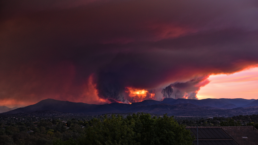Climate panel calls for “rapid and deep” transition away from fossil fuels.
By Lina Tran & Joseph Winters, Grist
Nations have moved too slowly to curb climate change, and now must take swift and aggressive steps if they hope to avoid the worst impacts of global warming, the world’s top scientists warned on Monday. Greenhouse gas emissions must peak within the next three years, and in the next eight, the world must push fossil fuels aside, rapidly scaling up the use of clean energy like wind and solar. It is only through these “rapid and deep” emissions reductions, they said, that the world can get on track to reach net-zero emissions by 2050 and avoid 1.5 degrees Celsius (2.7 degrees Fahrenheit) of warming.
A new report from the Intergovernmental Panel on Climate Change, or IPCC — a United Nations body of leading climate experts from around the world — highlights key strategies countries can use to drive down greenhouse gas emissions and remove carbon dioxide from the atmosphere. There is no time to lose, the report authors said. Although emissions are rising more slowly than they have in previous years, humanity has lost precious time to drive down climate pollution, and even with the most ambitious policies, there is now only a 38 percent chance that the world will stave off a 1.5-degree C rise in temperature. This is a significant decrease from 2018, when the panel predicted a 55 percent chance of staying below that threshold.

“We are at a crossroads,” IPCC chair Hoesung Lee, an economist at Korea University in Seoul, South Korea, told reporters. “We have the tools and know-how to limit warming and secure a livable future.”
The new report is the final installment in a three-part assessment from the IPCC. The body’s previous reports detailed both the current and future catastrophic impacts from climate change and warned that time is running out to adapt to them. This week’s report focuses on mitigation — what we can do to halt climate change.
Recent Posts
Is A Citizens United 2.0 Right Around The Corner?
July 15, 2025
Take Action Now Is it possible for American democracy to be further degraded by the influence of billionaires? Thanks to champion of the working…
U.S. Leaders Gave Up On Diplomacy With Iran. We Must Make Them Return To It.
July 15, 2025
Take Action Now Building an antiwar movement means preventing the systemic U.S. aggression that creates the conditions for war.By Hanieh Jodat,…
What To Do When You See ICE In Your Neighborhood
July 14, 2025
Take Action Now How can you deter the Trump administration’s immigrant deportation machine when it pops up in your community? Follow these…
ICE Campaign Of Violence Will Lead To More Deaths
July 14, 2025
Take Action Now Jaime Alanis’s death shows the horrific consequences of a secret police force behaving with utter impunity.By Natasha Lennard, The…




